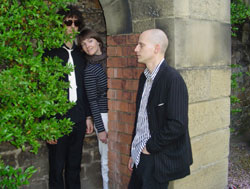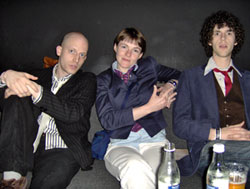Essay written Aug. 2006

In the fall of 1999, composer/guitarist Rob Reich and I presented a performance of a 40-minute semi-structured improvisation in Kulas Recital Hall at Oberlin Conservatory. We decided to promote the concert using something less ordinary than a standard concert poster. We took separate magazine ads of half-naked, muscular men and arranged them so that two men were facing each other. We took male-seeking-male personal ads from a newspaper (i.e. “WGM looking for BGM for a good time. You are open-minded and romantic. I am strong and funny and very attractive.”), and pasted one personal ad below the image of each man. On top of one man, we wrote “Corey Dargel” (that’s me), and on top of the other man, we wrote “Rob Reich.” Rob and I were not dating (we come from different sides of the sexuality spectrum), but we thought it was funny to advertise the concert as sort-of a blind date. It was, after all, an improvised performance, and there is always the possibility that no matter how well-suited the performers are to one another, the improvisation could prove to be an awkward situation that gets more and more awkward and difficult to end.

At any rate, we thought the posters were clever and appealing, and we were surprised to find one morning that they had been taken down. I don’t remember who told us, but the rumor was spreading that the Conservatory’s Dean at the time, Robert K. Dodson (no relation to James Dobson), was offended by the posters. Sure enough, we were asked to meet with Dean Dodson and then-Assistant Dean David Stull.
(Stull is now the Dean of Oberlin Conservatory, and Dodson is now provost of New England Conservatory.)
They informed us that our posters violated Oberlin’s Sexual Harassment Policy. This contention was absurd enough to make me laugh out loud. There was absolutely nothing obscene about the posters. The men were all wearing pants (or, if they weren’t, you couldn’t see below their waists to tell); there was no profanity; and all of the source material was taken from mainstream periodicals and local papers that can be found in “family-friendly” places.
It was clear to Deans Dodson and Stull that they needed to help me recognize the seriousness of the situation, so they explained with conviction that the posters had created what the Sexual Harassment Policy refers to as “an uncomfortable or threatening atmosphere.” Rob and I expressed our confusion over how someone might find these posters intimidating. It turns out that Dodson’s and Stull’s concern was for the young children who attend Oberlin Conservatory’s preparatory training programs. Though they could not present any evidence of complaints, the Deans were certain that parents would not be pleased to have their precious child prodigies exposed to such sexually “threatening” propaganda.
It didn’t seem to occur to Deans Dodson and Stull that throughout the campus there were other posters for other events that were much more “threatening” than Rob’s and my posters. If you walked across the College campus on any given day, you’d see at least one overtly sexual poster. Conservatory students have (or had, when I was there) a reputation for being disengaged from the College. Perhaps the same was true for Deans Dodson and Stull. The Conservatory, by definition, tends to encourage a much more conservative atmosphere than the College, but I never had a sense that anyone in a position of power was homophobic, except for these two men.

It was hard to take Deans Dodson and Stull seriously, but it was also evident that they would not compromise their points of view. They had made up their minds. We were threatened with “further action” if we re-posted, but we re-posted anyway. Our posters would often come down within hours of when they were put up, but we kept at it. Our concert was a success, and the house was packed. Rob and I were inspired to collaborate on a full-length CD album called “file under popular” which was reviewed by Paul Cox (’92) in Oberlin Online’s Listening Room. We performed songs from “file under popular” in a concert at The Knitting Factory in May, 2000, and were given a very positive review in the Village Voice by Kyle Gann (’77).
Since then, Rob and I have gone our separate ways. He’s making music with multiple bands in the Bay Area. I’m living in Brooklyn and just released my debut solo album, Less Famous Than You. Rob and I will soon be collaborating on new projects thanks to the magic of high-speed internet.



